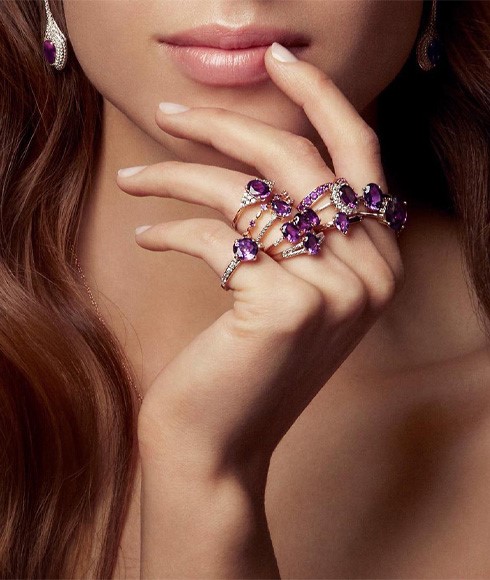The alluring purple hues of Amethyst have made this a much treasured gem for centuries, exquisite enough to be featured in Ancient Egyptian and British crown jewels. It was as expensive as Ruby and Emerald until large deposits were discovered in Brazil. One of the most widely noted beliefs is that Amethyst prevents intoxication. I have ruggedly tested this notion and can confirm that it isn't true. Let's delve into one of the stories behind this theory.
According to Greek mythology, Amethyste was a beautiful virgin maiden who was on her way to worship at the Temple of Diana. Unfortunately for Amethyste she came under the wrath of Bacchus, the god of wine, intoxication and grapes. Bacchus was pursuing Amethyste and became enraged when she refused his affections. When Amethyste cried for the virgin goddess Diana to help her remain chaste, she immediately answered her prayers and transformed her into a white glimmering Quartz stone to protect her from Bacchus. Humbled by her wish to remain chaste, Bacchus poured red wine over the stone as an offer of respect, transforming the stone into the purple crystals we now know as Amethyst.

There are several variations of this story. One version states that Bacchus had been mocked by a mortal and vowed to kill the next mortal that crossed his path. Amethyste happened to be the next mortal and Bacchus unleashed his two ferocious tigers upon her. As the tigers approached Amethyste, the goddess Diana transformed the maiden into pure Quartz to protect her from the tigers' savage claws. A remorseful Bacchus wept tears of wine at the sight of the beautiful Quartz statue, staining the Quartz purple.
A remorseful Bacchus wept tears of wine at the sight of the beautiful Quartz statue, staining the Quartz purple.
Although the story sounds like it was written in ancient times, it actually only dates back to the Renaissance period when the French poet, Remy Belleau, created it in 1576 as part of a poem on gemstone beliefs. Nonetheless, the idea that Amethyst prevents intoxication does indeed go back to the Ancient Greeks. The word Amethyst comes from 'Amethystos', which literally translated means 'not intoxicated' in Greek. 'A' – 'not' and 'methystos' – 'intoxicated'. The Ancient Greeks would drink from vessels made from Amethyst, wear Amethyst or keep it in their mouths in the belief that it would prevent them from becoming drunk and would instill a sober and serious mind.
To this day, metaphysicians claim that Amethyst is one of the most effective healing stones as it counteracts the earth's negative energies. Whatever your belief, Amethyst is an exquisite gemstone with a fascinating history and is a must-have gemstone in any jewelry collection.
DISCOVER AMETHYST
MORE GEMSTONE LORE
Iolite
Moonstone
Lapis Lazuli
Emerald
Labradorite
Jade
Turquoise
Opal
Aquamarine
Rose Quartz

